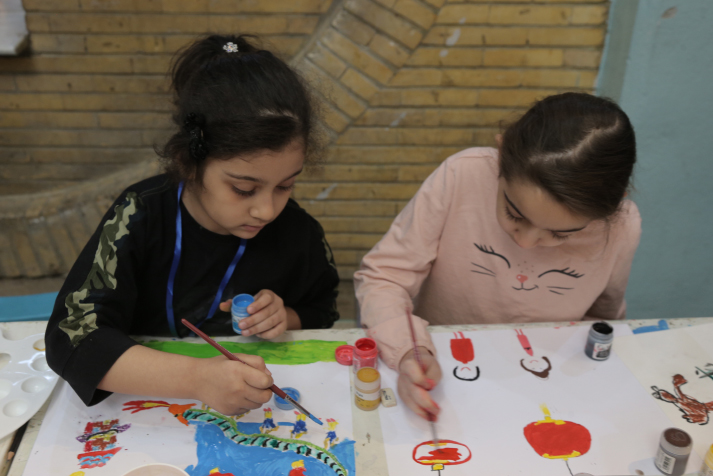| Voice |
| Setting sail for the East | |
|
|
 Participants adorn their canvases with a bright spot of color at the first China-themed painting competition for Iranian children and teenagers in Tehran, Iran, on January 4 (XINHUA)
Iranian President Ebrahim Raisi paid a state visit to China from February 14 to 16 at the invitation of Chinese President Xi Jinping. He was the first Middle East leader Beijing received after the 20th National Congress of the Communist Party of China in October 2022. Since he took office in August 2021, Raisi has been adhering to the nation's "Look to the East" policy, underlining the importance of cooperation with China to Iran's development and security. In their Beijing meeting, Xi and Raisi focused on strategic cooperation between the two countries, injecting vitality and confidence into the bilateral relationship. They reaffirmed their commitment to strengthening the time-tested friendship between the two countries amid changing international and regional situations. Xi said China supports Iran in safeguarding its sovereignty, independence, territorial integrity and national dignity, and in resisting unilateralism and bullying, and opposes external forces interfering in Iran's internal affairs and undermining its security and stability. Raisi said both countries are resolutely opposed to unilateralism, hegemonism and bullying, emphasizing that Iran firmly supports China in safeguarding sovereignty and territorial integrity and is ready to maintain sound cooperation with China in multilateral settings such as the Shanghai Cooperation Organization to jointly safeguard international fairness and justice, and maintain regional and world peace and security. The two countries have been strengthening pragmatic cooperation since Xi's visit to Iran in 2016, when they established a comprehensive strategic partnership and showed their intention to frame a 25-year cooperation agreement, which was signed in March 2021. Raisi's visit, aiming to facilitate the implementation of the agreement in multiple areas, saw the signing of bilateral cooperation documents on agriculture, trade, tourism, environmental protection, health, disaster relief, culture and sports. China has proposed to deepen bilateral agricultural cooperation by importing more high-quality Iranian products. Iran, in turn, hopes to attract more Chinese tourists. The agriculture and tourism sectors are less susceptible to the sanctions imposed by the U.S. and its allies on Iran, thus unleashing great potential for new growth in China-Iran cooperation. Sustainable interstate relations call for greater people-to-people exchanges. The Chinese and Iranian governments share similar ideas and common interests. They can leverage the similarity through in-depth interaction in business and academia, and between the two peoples. Raisi talked with Chinese scholars studying Iran and Middle East affairs on February 15. On the same day, he was awarded an honorary professor title at Peking University and in a speech at the ceremony, he called for more interactions between academic institutions and think tanks in both countries. During Raisi's visit, China Central Television and the Iranian National Audiovisual Organization signed a memorandum of understanding (MOU) on cooperation. The National Cultural Heritage Administration of China and the Iranian Ministry of Cultural Heritage, Tourism and Handicrafts inked another MOU to establish a framework on promoting cultural heritage exchange and cooperation. The document covers diverse aspects such as joint excavation, conservation and restoration of cultural relics, crackdown on cultural relics smuggling, as well as academic research. The two countries also agreed to boost Chinese and Farsi language learning. Fifty representatives of government departments, think tanks and mass media from each side will be invited by the other in 2023 to share experience in governance and administration. People have, in the past, held the stereotypical impression that important state visits are only about announcing big projects and signing major contracts. Raisi's visit, though, was not focused on substantial trade deals or the signing of individual projects, but rather on boosting the long-term development of the China-Iran relationship. The two countries are poised to engage in more strategic and comprehensive cooperation and play a more important role on the global political stage. The author is deputy director of and associate research professor at the Institute of Middle East Studies of China Institutes of Contemporary International Relations Copyedited by G.P. Wilson Comments to liwenhan@cicgamericas.com |
|
||||||||||||||||||||||||||||
|
